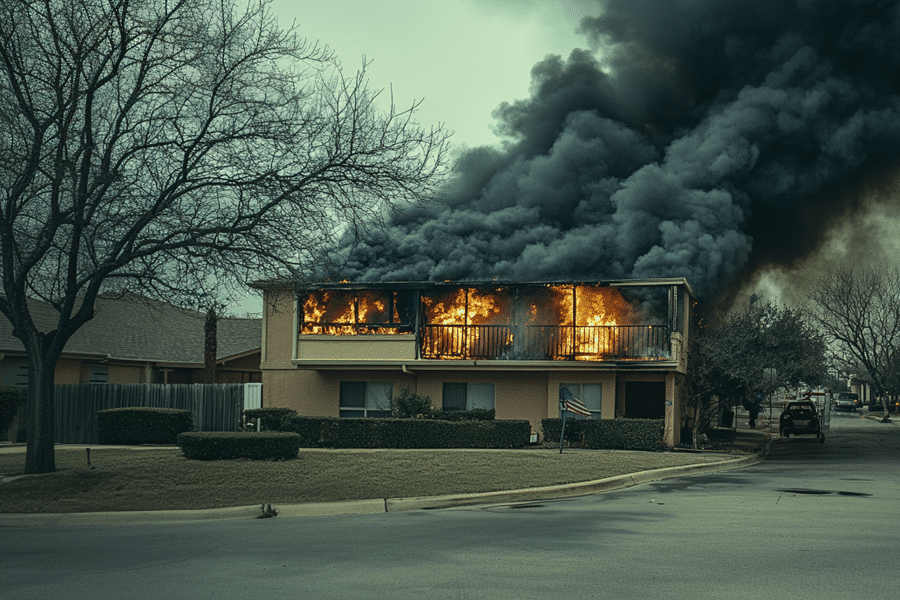Key Takeaways
- Insufficient coverage is a leading reason for fire claim denials; regular policy reviews are crucial to ensure adequate limits.
- Cooperating with investigations and maintaining fire safety measures can help prevent claims from being denied due to arson suspicion or negligence.
- Accurate documentation and timely claim submission are essential for avoiding denials; homeowners should keep organized records and know their policy exclusions.
Let's Go Beyond, to Bring You Back
Let's get you the compensation you're entitled to. Get a FREE Consultation today.
Let's Go Beyond, to Bring You Back
You deserve the compensation you’re entitled to, call for your FREE Case Review today.
Insufficient Coverage
One of the most common reasons for fire claim denials is insufficient coverage. Imagine losing your home to a fire only to find out your insurance policy doesn’t cover the full extent of the damage. This can happen if homeowners don’t regularly review and update their insurance policies to ensure they reflect current property values and potential fire-related losses. It’s crucial to understand that low coverage limits significantly increase the chances of a claim denial.
The financial impact of insufficient coverage can be devastating. Homeowners may find themselves facing steep out-of-pocket costs to repair or replace their property. Consider additional riders or endorsements to enhance your fire insurance protection. These can provide extra layers of security and ensure that you are adequately covered in the event of a fire.
Regular policy reviews and consultations with your insurance agent can help you stay on top of your coverage needs. This ensures you avoid the unpleasant surprises of claim denial due to inadequate coverage and guarantees your policy limits are enough to cover potential fire damages.
Arson Suspicion

This process can be stressful for the homeowner. While maintaining the integrity of fire insurance claims by preventing actual fraud is important, some insurers use this process to deny or delay paying what they owe when there is no evidence of arson.
Insurance companies look for discrepancies and signs of intentional destruction. If evidence suggests that the fire was set deliberately, the claim will likely be denied.
Homeowners should be aware that cooperating fully with the investigation and providing all necessary information is crucial. Honesty is paramount during this process to avoid being accused of fraudulent activity.
Working fire extinguishers, functioning smoke detectors, and well-maintained wiring can help demonstrate that the fire was accidental and not due to negligence or intentional acts. Implementing these safety measures protects your home and strengthens your case in the event of a fire.
Failure to Disclose Information
Failing to disclose accurate and complete information when applying for fire insurance can lead to claim denials. Insurers rely on the information provided during the application process to assess risk and determine coverage. Omissions or misrepresentations can result in serious consequences for your insurance coverage.
Providing false or incomplete information can be grounds for an insurer to claim insurance fraud, and can lead to your claim being denied. Honesty and thoroughness during the application process help avoid complications during claims.
Remember, insurance companies have a financial motive to deny claims, so it’s in your best interest to disclose all relevant information accurately and avoid giving them an excuse to deny your claim.
Claims Attorney in Texas
Get Compensated For Your Injuries & Damages! Call Us For A FREE Case Review And Know What Your Case Is Worth.
Policy Exclusions
Understanding policy exclusions is vital for avoiding fire claim denials. Insurance policies often exclude coverage for damages caused by intentional acts such as arson, acts of war, and certain natural disasters. Homeowners must thoroughly understand their policies to prevent unexpected denials.
Substantial evidence is needed to support claims of arson; insurers are not supposed to deny a claim based solely on suspicion. However, if the source of the fire is unknown, insurers might assume it was caused by arson, leading to an improper claim denial.
Regularly reviewing your policy and understanding its exclusions can help you avoid these pitfalls and ensure that you’re adequately protected.
Non-Payment of Premiums
Non-payment of insurance premiums is a straightforward, yet common, reason for fire claim denials. If you fail to pay your premiums on time, your policy could be canceled, leaving you without coverage when you need it most. This lapse in coverage can result in denied claims, even if the fire damage occurs shortly after the policy lapses.
To prevent this, ensure that your premium payments are up-to-date and monitor them regularly. Staying on top of your payments guarantees continuous coverage and prevents claim denials due to non-payment.
Remember, it’s crucial to maintain your insurance policy to ensure you’re protected in case of a fire.
Late Claim Submission
Timely submission of fire insurance claims is essential to avoid denials. Insurance policies typically specify time limits for reporting claims, and failing to meet these deadlines can result in denied claims. Promptly notifying your insurer about any loss is critical.
Homeowners should familiarize themselves with the claims process and the specific timeframes outlined in their policies. Starting the insurance claims process as soon as possible after a fire incident ensures that all necessary documentation and evidence are gathered in a timely manner, preventing claim denials due to late submission.
Inadequate Documentation

Key documents include a copy of your insurance policy, photographs or videos of the damage, repair estimates, and receipts for any expenses incurred. Keeping detailed records of your property’s condition and any updates or repairs can significantly strengthen your case when filing a fire insurance claim. Organizing these documents systematically ensures they are easily accessible when needed.
Pre-Existing Damage
Pre-existing damage can significantly affect the approval of fire insurance claims. If there is evidence that the damage existed before the policy began or was caused by neglect, the claim might be denied. Providing complete information about any previous damages or renovations helps avoid complications.
Regular inspections and maintenance are essential to prevent issues related to pre-existing damage. By keeping your property in good condition and addressing any potential problems promptly, you can reduce the risk of claim denials due to pre-existing damage.
Disputed Valuation of Loss
Disputed valuation of loss is a common issue that can lead to fire claim denials. Accurate documentation is crucial for insurance adjusters to evaluate the extent of damages and determine appropriate compensation. Disagreements regarding the property’s worth can result in claims being denied.
To avoid disputes, consider using advanced tools such as 3D virtual tours and schematic floor plans to document your property. Professional evaluations or negotiations may also be needed to settle valuation disputes and ensure a fair settlement.
Misrepresentation
Misrepresentation during the insurance application process can lead to claim denials. Providing false or misleading information may be considered insurance fraud and can have serious consequences for your coverage. It’s crucial to be honest and thorough when applying for fire insurance.
Concealing relevant information or providing incorrect details can lead to claim denial. Insurers take misrepresentation seriously and may refuse to honor a claim if intentional misrepresentation is detected. Honesty and transparency are key to preventing future claim denials.
Steps to Take If Your Fire Insurance Claim Is Denied
Facing a denied fire insurance claim can be daunting, but there are steps you can take to address the situation. First, carefully review the denial letter to understand the reasons behind the insurance company’s decision. Next, contact your insurer to discuss the denial and seek clarification.
Gathering comprehensive documentation is crucial to support your case. This includes photos of the damage, repair estimates, and a copy of your insurance policy. If necessary, consult an attorney experienced in fire claims to help navigate the appeals process and protect your rights.
Reviewing the Denial Letter
Carefully reviewing the denial letter is the first step in addressing a denied claim. The letter will outline the specific reasons for the denial, such as insufficient coverage or policy exclusions. Understanding these reasons is crucial for identifying any misunderstandings and determining the next steps.
Contacting Your Insurer
Contacting your insurer directly can help clarify the denial and provide additional information that might support your claim. Engage with your insurer to ask detailed questions and gather the necessary information to address the denial.
Gathering Evidence
Gathering evidence is essential when appealing a fire insurance claim. Compile all relevant documents, including photographs of the damage, repair estimates, and a copy of your insurance policy. Thorough and organized documentation enhances the strength of your appeal.
Consulting an Attorney
Consulting an attorney can provide valuable assistance in navigating complex negotiations with your insurance company. An experienced attorney can help assess the situation and guide the next steps to protect your rights and secure a fair settlement.
Preventing Fire Claim Denials
Preventing fire claim denials involves taking proactive measures to ensure your claim is successful. Adequate coverage, maintained safety measures, and detailed records are key steps in this process.
Implementing these measures can significantly lower the likelihood of your fire insurance claim being denied.
Ensuring Adequate Coverage
Regularly reviewing and updating your insurance policy ensures coverage limits adequately reflect potential fire-related losses. Including additional coverages, such as extended replacement cost and building code coverage, can help avoid underinsurance.
Regular policy reviews help prevent coverage gaps that could lead to claim denials.
Maintaining Safety Measures
Maintaining safety measures is crucial for preventing fires and ensuring that your insurance claims are honored. Insurance policies may require specific safety measures, such as installing smoke detectors and fire extinguishers, to be in place.
Regular inspections and maintenance of safety devices reduce fire hazards and demonstrate to insurers your responsibility as a homeowner.
Keeping Detailed Records
Keeping detailed records of your property and any updates or repairs is essential for supporting your fire insurance claims. This includes photographs of the property’s condition, receipts for repairs, and written estimates of damage.
Organized documentation makes records easily accessible when needed and aids in resolving disputes over loss valuation during the claim process.
Frequently Asked Questions
Why is it important to regularly review my insurance policy?
Regularly reviewing your insurance policy is crucial to ensure your coverage accurately reflects the current value of your property, preventing insufficient coverage and potential claim denials. This proactive approach safeguards your financial interests.
What should I do if my fire insurance claim is denied?
If your fire insurance claim is denied, review the denial letter for specific reasons and contact your insurer for clarification. It’s essential to gather supporting documentation and consider seeking legal advice to strengthen your case.
What types of documentation are necessary to support a fire insurance claim?
To effectively support a fire insurance claim, you need to provide a copy of your insurance policy, photographs or videos of the damage, repair estimates, and receipts for incurred expenses. Detailed records of your property’s condition further strengthen your case.
How does non-payment of premiums affect my fire insurance coverage?
Non-payment of premiums can result in the cancellation of your fire insurance policy, leading to a lapse in coverage and potential denial of claims for fire damage. It’s crucial to ensure your premiums are paid on time to maintain active coverage.


